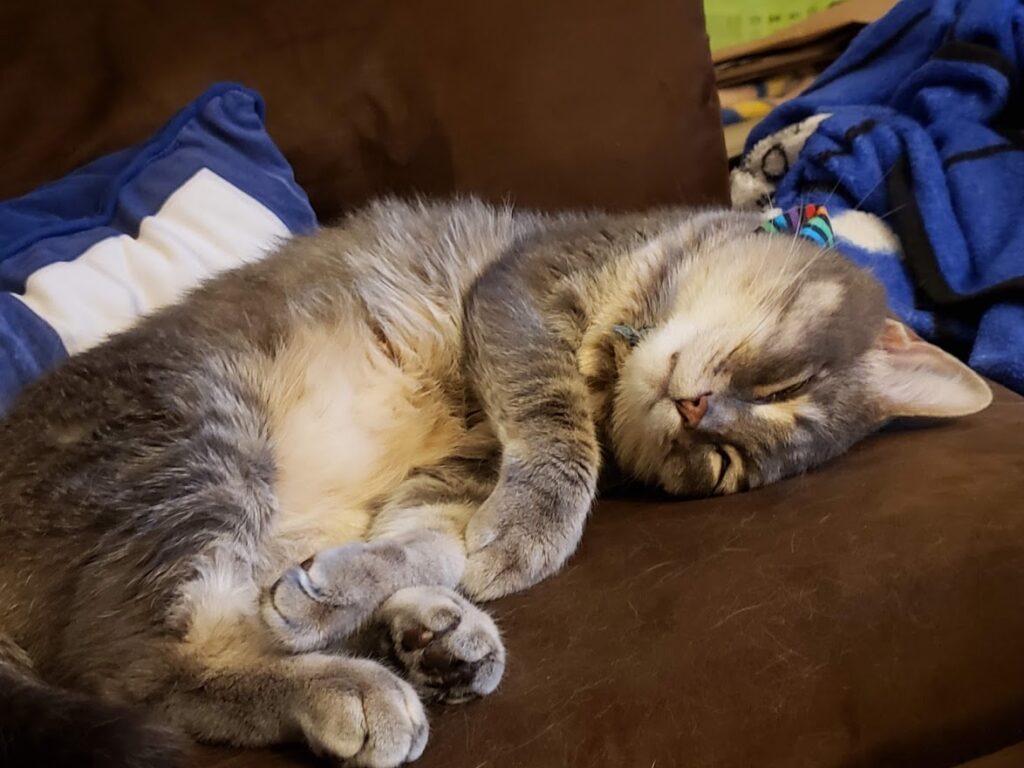What is feline asthma?
Feline asthma is a disease of the lungs that affects as many as 5% of cats. Most researchers believe that feline asthma is caused by an allergic reaction to something in the air, stimulating the immune system inappropriately. When exposed to these allergens, the airways will constrict due to inflammation. Inflammation also leads to mucous build up. The combination of both mucous and constricted airways results in difficulty breathing and the coughing we typically see.
Could my cat have asthma?
The average cat that is diagnosed with asthma is between 4 and 5 years old. It is common in both sexes, and any breed of cat can suffer from asthma. The most common signs of asthma include difficulty breathing, wheezing, rapid breathing, or, more commonly, it appears the cat is trying to vomit a hair ball, but nothing ever comes up. Sometimes, they do cough so hard that they vomit. While they are having an attack, a cat will hunch close to the ground and extend his or her neck out to try to help increase air flow.
Asthma is not the only cause of coughing in cats, however, so your veterinarian will want to rule out other causes first. One cause, although not common, includes the lungworm. This is a worm that travels from the gastrointestinal tract to the lungs. It can cause coughing; and looks like asthma on x-rays. It is treated with a broad spectrum de-wormer, prescribed by your veterinarian. Often, in any cat with signs of asthma, we recommend using a broad spectrum dewormer, even if the cat is indoor only, as it will not hurt and can only help. Bacterial and fungal infections can also cause coughing, so a round of antibiotics may be started by your veterinarian if there are other signs of an infection. Bacterial infections are often diagnosed with a good physical exam, x-rays, and blood work.
More sinister signs of coughing include heart failure or cancer. These are often diagnosed with x-rays and/or an echocardiogram. Treating a cat with heart disease as if it has steroids can be extremely dangerous; this is why your veterinarian will recommend x-rays before we start treatment.
Diagnosing Asthma
Asthma cannot be proven, so your veterinarian will have to rule out all other causes of disease first. A video of the coughing behavior can really help your veterinarian out when it comes to diagnosing this disease. Most cases are diagnosed with x-rays, a fecal sample, blood work, and a physical exam. Some cases may require extra diagnostics, like a cytology of airway secretions (looking at the secretions under a microscope), a CT scan, or even bronchoscopy (where a tiny camera is put in the cat’s airways to evaluate and take samples). Blood samples to look for allergies may also be an option for your cat.
Treatment of Feline Asthma
Treatment of asthma is requires a multi-modal approach. At home, you can keep your cat’s area as dust free as possible; vacuum and dust frequently, and consider purchasing an air purifier. Ensuring no smoke, candles, or incense are burned in that area. Your veterinarian will also likely prescribe a de-wormer, in case of lung worms and possibly recommend a trial course of antibiotics. Because these cats are often uncomfortable, we start them on oral steroid medication, to get them relief as soon as possible. Oral steroids work well, but come with many side effects, including increased thirst, increased appetite, and anxiety. In some cases, they can be hard on the heart or cause diabetes. These are the reasons we do not like to use steroids long term. Once starting on steroids, your veterinarian will also likely recommend an inhaled steroid; which has fewer side effects, but dose take longer to work. Once the inhaled steroids are taking effect, your vet will likely recommend weaning your cat off of the oral steroids.
There are special inhalers made for cats, and the inhalant is something humans use for asthma. This will be a long term medication for your cat. We often try to wean down the dose to the lowest effective dose, but we are generally unable to take them off the medication entirely. Some cats also need a ‘rescue’ inhalant, which is used only when they are having an active attack. It is a fast acting bronchodilator, but does not last long.
What does this mean for my cat’s lifespan?
Many cats with asthma live very long, happy lives! These medications keep them comfortable and allow them to play and run like any other cat!









